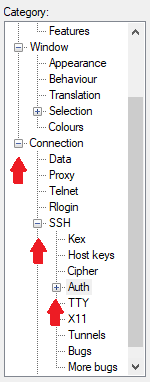The key terminology to look for is “SSH” or “SFTP” and “Public Key Authentication”. Generating Your Keys. In general it’s best to create your own key. That way you control what happens to your private key, and no one else ever has to see it. PuTTY is a free SSH client that includes a tool for generating keys, called.
Generating Authorized_keys Filezilla Sftp Tutorial
Generating SSH Keys for SFTP Adapters - Type 2. Open NWA Key Storage and Add a View 'SFTPTEST'. Add the public key to authorizedkeys and verify the access. How to configure passwordless ssh & sftp access in Unix & Linux systems? Follow these simple steps with examples with a basic troubleshooting section at the end. Sftp uses underlying ssh access for authentication and after you establish passwordless ssh access you will have passwordless sftp access a s well. Sftp using private and public keys hi guys, i have few files i have to do sftp, the public and private key work like a magic, no problem at all the syntax is as below Code. Apr 19, 2019 Further extend Microsoft's implementation of OpenSSH in Windows 10 by generating your own secure keys. The SCP and SFTP utilities to make transferring keys completely secure. Ssh directory. YouTube requires that you connect to your YouTube dropbox using a Secure Shell (SSH) connection. SSH is a network protocol that ensures secure data transfer. SSH authenticates you using public-key cryptography. You create a pair of keys: a private key that resides on your client computer and a public key that your dropbox server uses.
The PuTTYgen program is part of PuTTY, an open source networking client for the Windows platform.

Filezilla Sftp Command Line
- Download and install PuTTY or PuTTYgen.
To download PuTTY or PuTTYgen, go to http://www.putty.org/ and click the You can download PuTTY here link. Generate ssh key github windows.
- Run the PuTTYgen program.
- Set the Type of key to generate option to SSH-2 RSA.
- In the Number of bits in a generated key box, enter 2048.
- Click Generate to generate a public/private key pair.
As the key is being generated, move the mouse around the blank area as directed.
- (Optional) Enter a passphrase for the private key in the Key passphrase box and reenter it in the Confirm passphrase box.
Note:
While a passphrase is not required, you should specify one as a security measure to protect the private key from unauthorized use. When you specify a passphrase, a user must enter the passphrase every time the private key is used.
- Click Save private key to save the private key to a file. To adhere to file-naming conventions, you should give the private key file an extension of
.ppk(PuTTY private key).Note:
The.ppkfile extension indicates that the private key is in PuTTY's proprietary format. You must use a key of this format when using PuTTY as your SSH client. It cannot be used with other SSH client tools. Refer to the PuTTY documentation to convert a private key in this format to a different format. - Select all of the characters in the Public key for pasting into OpenSSH authorized_keys file box.
Hacks cracks and key generaters for phone rescue. Make sure you select all the characters, not just the ones you can see in the narrow window. If a scroll bar is next to the characters, you aren't seeing all the characters.
- Right-click somewhere in the selected text and select Copy from the menu.
- Open a text editor and paste the characters, just as you copied them. Start at the first character in the text editor, and do not insert any line breaks.
- Save the text file in the same folder where you saved the private key, using the
.pubextension to indicate that the file contains a public key. - If you or others are going to use an SSH client that requires the OpenSSH format for private keys (such as the
sshutility on Linux), export the private key:- On the Conversions menu, choose Export OpenSSH key.
- Save the private key in OpenSSH format in the same folder where you saved the private key in
.ppkformat, using an extension such as.opensshto indicate the file's content.